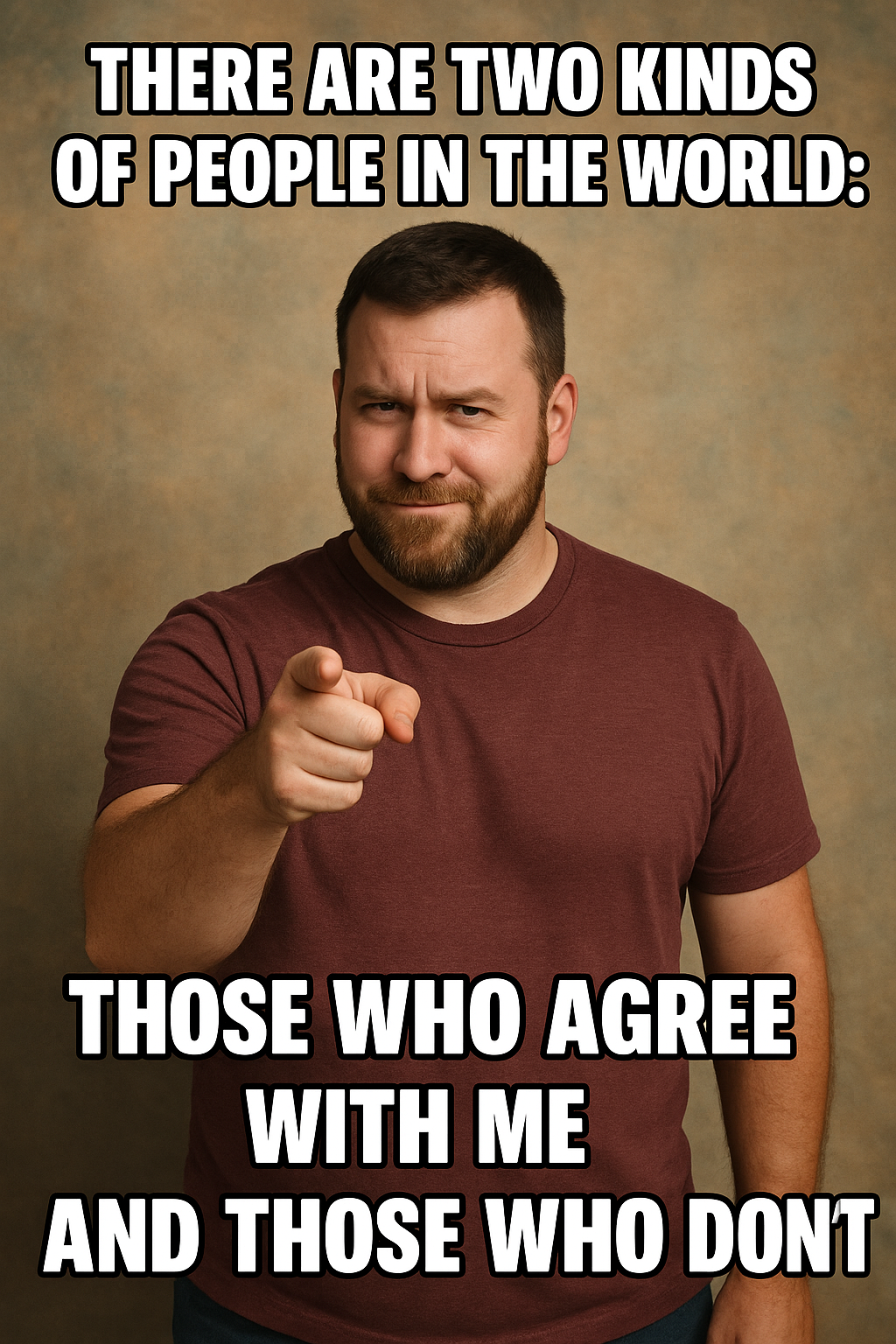
Let’s start this out with a joke:

Technically, that is true; there is always someone who agrees with a given person, and plenty of people who don’t. But I would argue that there we could divide the second group into those who disagree respectfully and those who disagree rudely. That means there are actually three kinds of people in the world.
Opinions Will Vary
Jokes aside, there will always be people with differing opinions about things. When it comes to whether you like pineapple on pizza or not, it doesn’t matter. As long as you don’t make someone who doesn’t like pineapple on pizza eat it. It’s just an opinion. I like cilantro; my friend doesn’t. So she makes salsa without it. And if that’s what is available, I eat it. But I prefer cilantro in my salsa; it’s not authentic without it.
Maybe you’ve heard the story of the man, his son, and the donkey. When they tried to conform everyone’s opinions, they ended up miserable. In case you don’t remember, here’s a cute AI-generated video that illustrates this parable:
When it comes to Bible doctrines, people certainly have different opinions! Even within a denomination, people disagree. And that is fine. Disagreement is healthy. There is a saying that if you get ten Jewish men together to discuss a topic, there will be 11 different opinions. The Jewish Talmud encourages discussion and argument, even regarding theology. The discussion—and probably the connection the men formed as they debated—was the point; consensus was irrelevant.
The Right and the Wrong Way
But there is a right and a wrong way to discuss differing points of view. Maybe you’ve heard of logical fallacies. They are basically faulty logic, and a person who has studied them can pick them out quite readily. There are whole YouTube videos dedicated to picking out the logical fallacies of one thing or another. Watching them can be a great form of educational entertainment. I remember taking a college class where the teacher used clips from The Simpsons to illustrate various logical fallacies. Here is one such clip:
The ad hominem fallacy focuses on attacking the other person instead of focusing on their arguments. It is often used to distract the hearer from potentially unanswerable points. Instead, it discredits an idea by discrediting the one presenting it.
That type of fallacy is easy to spot once you are aware of it. Just watch the news. I’ll refrain from discussing particular politicians, but if you pay attention to what politicians say, you’ll find many, if not most of them, use this fallacy, mostly because it works.
But any middle school student could learn to recognize that. Let’s go deeper.
But Is It Kind?
It’s bad enough if we attack the character of the person who is making the argument. But suppose the topic of discussion involves people. How we talk about them is important.
Let’s just take a current news item: immigration. Whether you believe that ICE is doing the right thing in deporting people, or whether you think that they should only be deporting violent criminals like rapists and murderers, is irrelevant to this present discussion. How you talk about those people matters. Do you rejoice when they are rounded up and put into detention camps that look more like a communist prison? Or do you grieve when you hear about the conditions they are in?
What about the LGBTQ community? Maybe you think that gay marriage is wrong. But do you start with what Leviticus says about a man lying with a male? Or do you start with compassion for the individuals who are dealing with something over which they have no control? Do you start by telling them that they need to repent of their sins? Or do you ask to hear their stories first?
The Right Way to Disagree
How we discuss controversial topics matters. I remember once a friend of mine, who is opposed to gay marriage for Biblical reasons, was asked something to the effect of whether she thought God loved gay people or not, and she answered yes. I wish I could find exactly what she said, but I just remember it being gracious and loving, recognizing they, too, are bearers of God’s image, and that she did not position them as lower than straight people. It was a beautiful response.
Preston Sprinkle, a Christian pastor, wrote a book called People to Be Loved. The word “people” in the title refers to those in the LGBTQ community. He didn’t call them gays in the title. He called them people. By doing this, he humanized them. Even better, he starts the book with a tale of his wrestling with the topic, showing that he deeply cares about them. I may not agree with his conclusions, but I cannot fault his heart. He leads with love and compassion, even though he ultimately comes to a different conclusion than I do. I respect him for this.
The Wrong Way to Disagree
In contrast to him, take the case of another pastor, who was my friend on Facebook. This man used to comment periodically on posts I made supporting the LGBTQ community. He was always very blunt and always led with what he believed was the truth. He called gay marriage an abomination and said that gay people need to repent of their sins. (As if they all are guilty of having gay sex, which is not the case; many, especially in the Christian community, are celibate.) If he expressed any compassion for them, it was well after he had condemned them.
When one of my gay friends added his two cents to the conversation, this pastor responded with, “I think you have allowed sex to be your identity. Our identity needs to be in Jesus.” He said this to a person he had never met before! To a man had just shared his story of begging Jesus to make him straight for 40 years! No compassion. No empathy. Just judgment.
I was grieved. Not because this man disagreed with me. Not because he was pushing ideas I didn’t believe. No, I was grieved because I was hoping to see more of a Christlike spirit from a pastor.
Be Willing to Learn
By contrast, another pastor who holds the same position as he does also commented on the same post. But he started by asking for clarification, pointing out that people can talk past each other by having different definitions of the same word. In this case, he was referring to the word “gay.” Some people use it to refer to those who are having sex with people of the same sex as themselves. Some use it to refer to anyone who is same-sex attracted, regardless of their sexual activity or lack thereof. He respectfully presented his beliefs on the topic, but added, “I’m always open to hearing other opinions.” I appreciated his comments.
Another time I shared with a pastor about a gay friend who was dealing with issues because he is married yet a dedicated Christian. I shared that he’s struggling to find a church he can be active in. Because he is not the kind of person who would ever be happy just warming a pew! As I shared his story, this pastor said, “My pastor’s heart goes out in sympathy for him. I think I know what the Bible says on the topic, but maybe I need to take another look at it. Maybe I need to wrestle with those verses a bit more.” He didn’t change his views that night, but he wrote down a couple books I recommended and said he’d read them. He led with compassion, and it prompted him to be willing to look deeper.
Focus Matters
These three pastors present a contrast. One focuses on on “the truth” as he understands it, emphasizing the importance of speaking this truth to those who are, in his opinion, in error. When asked about nuance, instead of admitting that maybe he doesn’t have all the answers or acknowledging that it would be really hard for a person to deal with that kind of situation, he doubles down and hides behind his theology.
The other two are open to hearing different ideas, even though they hold the same theological position as the first pastor. Their heart is moved when they hear about the struggle that gay Christians endure to reconcile their experience with their theology. They see people who are hurting, and like a good shepherd, they want to comfort the person and help them, not hurt them.
Hating Is Optional—Being Like Jesus Isn’t
On social media, I regularly see people saying things like, “I hate Trump” or “If you hate Trump, let’s be friends.” I get where they are coming from, but their words bother me. I don’t hate Trump. It is true that I strongly disagree with him. I could use some descriptive adjectives to describe him if I wanted to. But hate him, I do not. I may hate some of the things he is doing, but I do not hate him.
The truth is, I don’t hate anyone. I am sad for Trump. He is to be pitied. I recognize that hen he was a child, his father did not love him. This shaped the way he is now. I am even more saddened at what little Donny must have endured, never being able to receive the love of the one man who should have given him unconditional love. No child deserves that. I don’t wish for him to rot in hell because of how he is treating those he doesn’t like. It all just makes me sad
My heart says that dehumanizing him is just as bad as his dehumanizing of others. I believe that this attitude is a manifestation of the heart of God. It reveals the heart of flesh (Ezekiel 36:26) that God has given me to replace the hard, unloving heart I had before.
Once, someone called me out for posting something that made fun of a situation involving Trump. I acknowledged that I had made a mistake and took it down. I’m not perfect. But I believe that we need to treat others with respect, even if we disagree with them. Especially if we disagree with them.
Because how we treat people tells us about the state of our heart.
And because loving people is what Jesus would do.

Pingback: Your Reactions Should Tell You Something - Lisa Reynoso - Abiding Hope Mental Health Coaching
Pingback: Facts vs. Opinions When We Disagree - Lisa Reynoso - Abiding Hope Mental Health Coaching